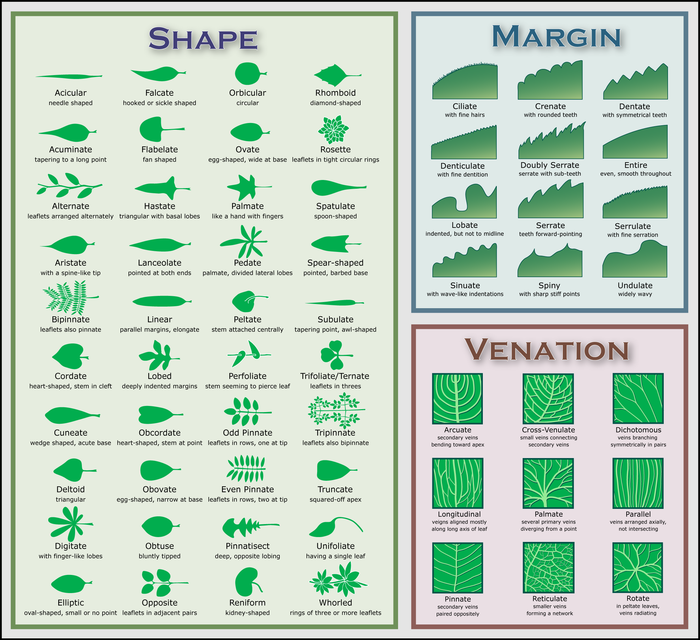Difference between revisions of "AY Honors/Trees - Advanced/Answer Key"
From Pathfinder Wiki
< AY Honors | Trees - AdvancedAY Honors/Trees - Advanced/Answer Key
| Line 6: | Line 6: | ||
==3. Separately collect, press, mount, and label specimens that demonstrate the following terms:== | ==3. Separately collect, press, mount, and label specimens that demonstrate the following terms:== | ||
| − | ;a. Serrate: The | + | ;a. Serrate: The margins of the leaf have forward-pointing teeth. |
| − | ;b. Doubly serrate: The serrations on the | + | ;b. Doubly serrate: The serrations on the margin of the leaf have serrations on them. |
| − | ;c. Entire: The entire | + | ;c. Entire: The entire margin of the leaf is smooth. (sassafras, pawpaw) |
| − | ;d. Crenate: The | + | ;d. Crenate: The margins of the leaf have rounded teeth. |
| − | ;e. Dentate: The | + | ;e. Dentate: The margins of the leaf have symmetrical teeth. |
;f. Lobe: The edges of the leaf have large, smooth indentations that do not go all the way to the centerline. (oaks) | ;f. Lobe: The edges of the leaf have large, smooth indentations that do not go all the way to the centerline. (oaks) | ||
;g. Incise: | ;g. Incise: | ||
;h. Whorled: | ;h. Whorled: | ||
| − | ;i. Opposite: Leaves are | + | ;i. Opposite: Leaves are paired on opposite sides of the stem. (sumacs, hickorys, walnut) |
| − | ;j. Alternate: | + | ;j. Alternate: Leaves are not across from one another on the stem, but are offset relative to one another. |
| − | ;k. Pinnately compound: | + | ;k. Pinnately compound: A leaf consisting of multiple leaflets. (sumac, locust) |
| − | ;l. Triple compound (if possible): | + | ;l. Triple compound (if possible): Like pinnately compund leaves except the leaflets have leaflets of their own. (devil's walking stick, mimosa). |
[[Image:Leaf morphology no title.png|thumb|700px]] | [[Image:Leaf morphology no title.png|thumb|700px]] | ||
Revision as of 01:41, 30 September 2006
1. Have the Trees Honor.
2. Collect, identify, press, and mount leaves of 35 different species of trees.
3. Separately collect, press, mount, and label specimens that demonstrate the following terms:
- a. Serrate
- The margins of the leaf have forward-pointing teeth.
- b. Doubly serrate
- The serrations on the margin of the leaf have serrations on them.
- c. Entire
- The entire margin of the leaf is smooth. (sassafras, pawpaw)
- d. Crenate
- The margins of the leaf have rounded teeth.
- e. Dentate
- The margins of the leaf have symmetrical teeth.
- f. Lobe
- The edges of the leaf have large, smooth indentations that do not go all the way to the centerline. (oaks)
- g. Incise
- h. Whorled
- i. Opposite
- Leaves are paired on opposite sides of the stem. (sumacs, hickorys, walnut)
- j. Alternate
- Leaves are not across from one another on the stem, but are offset relative to one another.
- k. Pinnately compound
- A leaf consisting of multiple leaflets. (sumac, locust)
- l. Triple compound (if possible)
- Like pinnately compund leaves except the leaflets have leaflets of their own. (devil's walking stick, mimosa).
4a. Describe the advantages in using the Latin or scientific names.
4b. Of what use are the two parts of a scientific name?
5. Name six families of trees in the angiosperm class and three families in the gymnosperm class.
6. Know and describe the function of leaves in the life of a tree.
7. Name the families of trees in your area which have opposite leaves.
8. Define the following terms:
- a. Stipule
- b. Petiole
- c. Blade
- d. Pitch
- e. Heartwood
- f. Sapwood
- g. Springwood
- h. Summerwood
- i. Annual ring
- j. Cambium
- k. Xylem
- l. Phloem
9. What families of trees have:
- a. Thorns
- b. Catkins
- c. Winged seeds
- d. Acorns
- e. Pods
- f. Capsules
- h. Berries
- g. Nuts

